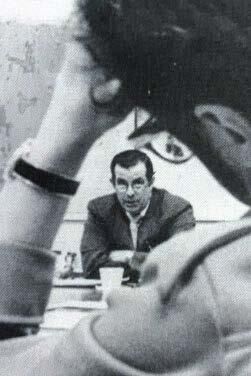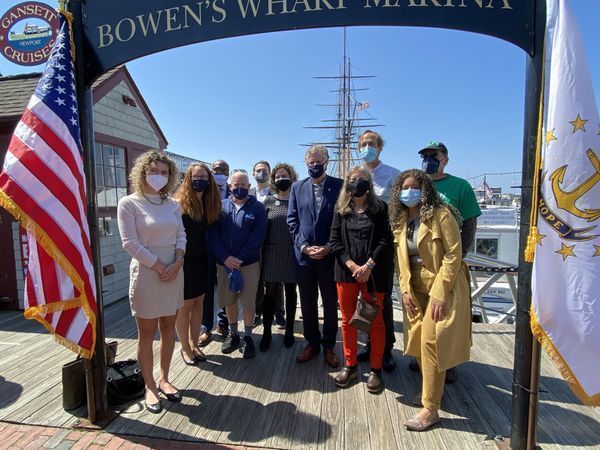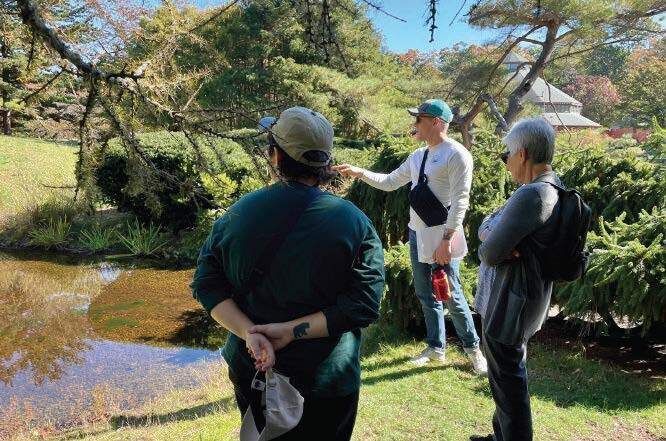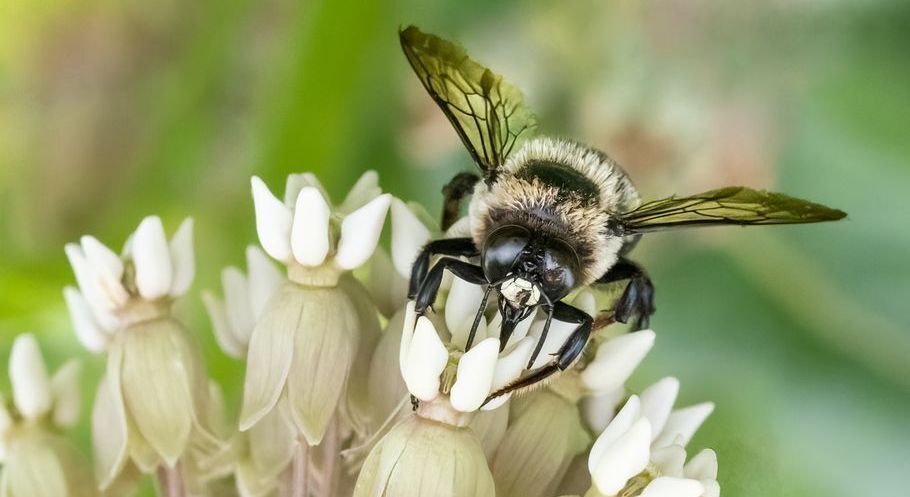
Published December 16, 2022
Nature's Voice: Protecting Birds, Forests and All Living Things for 125 Years
By Kristen Curry
If today’s news headlines seem daunting to look at, consider the state of Rhode Island 125 years ago. Land was claimed freely, industrialization spread widely, and there was little concern for the ramifications to public health. Cholera outbreaks were a public health threat and environmental pollution was widespread. The seeds of environmentalism were born in New England in the midst of this challenging time. The Audubon Society of Rhode Island was founded in 1897 by a group of concerned citizens who were looking to take action.
Birds — the original concern of the Society’s founding members — are still of concern today and remain front and center in Audubon’s work. But a host of other environmental issues have come to the forefront over the years and Audubon has expanded its fight to meet those challenges.
Perhaps Audubon’s biggest battle in the Hawkes years was against the proposed Big River Reservoir, a project meant to drown the Big River in West Greenwich and Coventry to build a supplement to the Scituate Reservoir. This long, drawn-out skirmish started in the 1960s and lasted until 1989, when the U.S. Environmental Protection Agency stepped in, agreeing that Rhode Island’s need for water was not acute enough to justify the destruction of thousands of acres of wetlands and habitat. Hawkes viewed the proposed new reservoir as both ecologically devastating and an unnecessary public expense.
Hawkes helped Audubon turn the lens from individual birds and species to the habitat they lived in and habitat protection. Such views were prescient for the time. In the 1979 Audubon Report, he wrote, “Our degradation of wildlife’s environment turns out to be a degradation of our own best interests.” In testament to Hawkes’ outsize role in statewide advocacy, upon his retirement in 1993, the Providence Journal called Hawkes the state’s “environmental conscience.
Rhode Islanders are looking to experts and environmental organizations such as Audubon to provide needed leadership to face the climate crisis. “There is a real sense of urgency in our advocacy work today,” De La Cruz says. “The awareness is there, and people are concerned about what will happen if we don’t act.”
Much of it starts with education. Audubon reaches approximately 22,000 people a year, providing multiple opportunities to talk about climate change, and manages nearly 9,500 acres of protected properties across Rhode Island and in nearby Massachusetts. One hundred and twenty-five years of advocacy and 5,000 members and supporters make Audubon a valued voice in Rhode Island’s environmental community. “125 years and the backing of our members brings influence,” De La Cruz says. “The key question is, what do we do with that influence?”
The 2021 Act on Climate enacted into law was a huge win, a real game-changer for the environmental community. “Now we have enforceable mandatory targets and policymakers and the public are actually engaged,” De La Cruz says.
Last year also saw the passing of the Ocean State Climate Adaptation and Resilience Fund, which establishes a program and funding to protect and strengthen coastal infrastructure and public access sites threatened by rising seas and erosion; the Forest Conservation Act, requiring the Rhode Island Department of Environmental Management to establish a commission that will look at ways to encourage forest conservation and strategies to preserve private forestland. We also saw the protection of money-saving energy efficiency programs that extend Rhode Island’s nation-leading energy efficiency programs; the “ask-first” law for plastic straws; and the prohibition of the intentional release of batches of inflated balloons.
There have been other wins recently, too. In 2022, the statewide plastic bag ban passed and legislation requiring 100% renewable electricity by 2033. The offshore wind industry, launched by the five wind turbines off Block Island, is growing quickly and will continue to advance as the State seeks to procure additional offshore wind. Neonicotinoids — the pesticides that are so dangerous to bees, butterflies, birds and other pollinators — are now restricted to use by only certified applicators, thanks to Audubon’s work with the Conservation Law Foundation, The Nature Conservancy, and legislative partners.
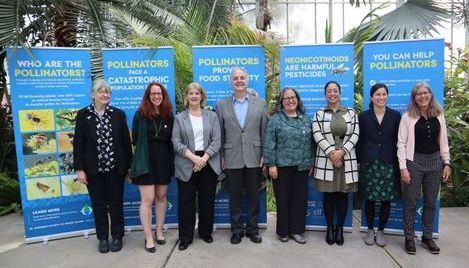
Legislation was passed in 2022 to protect pollinators by restricting neonicotinoid pesticides.
Still, “the biggest threat we all face is climate change,” says De La Cruz. “It will have impacts to birds, wildlife, and humans.” Despite this, De La Cruz says she’s seeing progress and fruitful conversations about the issues and how to protect land, wildlife, and communities in a changing climate. Organizations are considering the best way to advance both the protection of forests and expand clean, renewable energy in homes, buildings, and disturbed land. And there is new attention on the growth of jobs in the climate economy as well. More people are seeing the economic impact of climate change. “We have a real opportunity here,” she comments.
Audubon’s advocacy work takes years – and many partners – to be effective. The State’s first climate bill, Resilient Rhode Island, passed in 2014, setting greenhouse gas emissions targets. Enforceable greenhouse gas limits were enacted in the Act on Climate bill which passed in 2021. “We had to work hard to build a coalition to get Act on Climate passed,” recalls Meg Kerr, former Audubon senior director of policy. “The entire environmental community, along with organized labor, eventually got behind the bill and helped get it passed.” Kerr led Audubon’s advocacy efforts from 2016 to 2021, directing policy issues with skill, determination, and bringing a wide net of environmental partners to the table.
Team Effort
Kerr and De La Cruz both cite the critical importance of partnerships in their work. “Advocacy is a team sport,” Kerr says. “Audubon can lead, but without a strong and vocal team of partners working alongside us, nothing would get accomplished. We are very lucky in Rhode Island to have so many strong environmental partners who have a long history of working together. We also have the Environment Council of Rhode Island which is where the organizations come together. But each bill that passes, each power plant that is defeated, is always the work of a group of people and organizations, including Audubon.”
Recent open dialogue between various stakeholders is a sign of progress. Audubon is looking forward to expanding partnerships with labor and enlisting the power of labor as environmental justice advocates. “We are more effective working together,” De La Cruz comments.
While Audubon had its share of strong and effective advocacy voices in the past (see sidebar on page 5), the organization is now well-poised to speak across divides to different parties. It’s less a dictate of what needs to be done, more building a process of listening and working together so all are heard. Although people today are more educated and aware of environmental issues, challenges remain. The work is ongoing, and it can be a heavy load.
Community Matters
Audubon’s critical advocacy work only happens when members and supporters get involved. Individuals can participate in events, stay updated on current topics, and reach out to lawmakers. Legislators rely on hearing from constituents to make their decisions. “We’re all ambassadors,” says De La Cruz. “Together, we can make a real difference.”
Visit asri.org/lead to sign up for Audubon’s Eagle Eye updates on policy issues and please consider donating to Audubon’s advocacy efforts and supporting our critical work to protect Rhode Island’s environment.
Kristen Curry works in local nonprofit communications, with recent articles on plankton research at URI’s Bay Campus and water improvement in Roger Williams Park. She’s taken Audubon’s popular Owl Prowl and has also enjoyed walking on Rhode Island’s North-South Trail.

